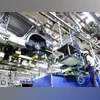Low-paid, migrant workers more prone to injuries in automobile sector
The report titled 'Crushed 2023' is the fifth annual study on the state of worker safety in the Indian auto sector
)
Photo: Bloomberg
Listen to This Article
The severity of injuries among the low-paid, unskilled and migrant workers appears to be worse than their skilled, educated and contractual peers, according to a report compiled by Safe in India Foundation (SIIF) and released on Sunday.
The report titled ‘Crushed 2023’ is the fifth annual study on the state of worker safety in the Indian auto sector.
Workers earning below Rs 8,000 in a month lost 2.34 fingers on average in an accident as compared to an average loss of 1.6 fingers by a worker earning more than Rs 20,000. Besides, 88 per cent of workers who lost fingers were temporary migrant workers, as against the 63 per cent who were hired on a contractual basis.
A typical crush injury to fingers results in the loss of two (2.01) fingers per injured worker, with a direct correlation between the income and severity of the accident.
Speaking at the launch of the report, VN Saroja, senior advisor, SIIF said that low-paid, unskilled migrant workers were more prone to lose their limbs as the firms have not invested adequately in their training.
“Mostly, migrant uneducated workers suffer a great deal of loss as they are not sufficiently skilled to operate the power press and other equipment in the factory. Most of the time, they are forced to work, flouting all government regulations,” she added.
The Automotive Skills Development Council prescribes a minimum education level of 8th standard for press shop operators, considering this a skilled job.
The auto sector accounts for a little over 7 per cent of India’s gross domestic product (GDP) and employs 8 million directly and 29 million indirectly. The Society of Indian Automobile Manufacturers (SIAM) estimates that by 2026, the auto sector will account for 12 per cent of India’s GDP and employ around 102 million people directly and indirectly.
The report also mentions that in more than half of cases (57 per cent), false details regarding the accident are provided to the Employee State Insurance Corporation (ESIC), which weakens the workers' position during litigation.
“Accidents happen in the production units of even big brands and in almost half of the cases, accidents occur due to malfunctioning machines. Most of the time, the employers also provide false information about the accident details. All these things make it easier for workers to claim compensation,” said Saroja.
The report also notes that the ESIC e- Pehchan (identity) card, which enables workers and their eligible dependents to access primary, secondary, and tertiary health services, and compensation in case of sickness, injuries, unemployment, childbirth, and death, was made available to a large majority of injured workers only after the accident, contrary to ESIC regulations which require it to be given on the day of joining their jobs.
More From This Section
Topics : Labourer labour market Auto sector Auto Indian migrants
Don't miss the most important news and views of the day. Get them on our Telegram channel
First Published: Nov 26 2023 | 5:50 PM IST
